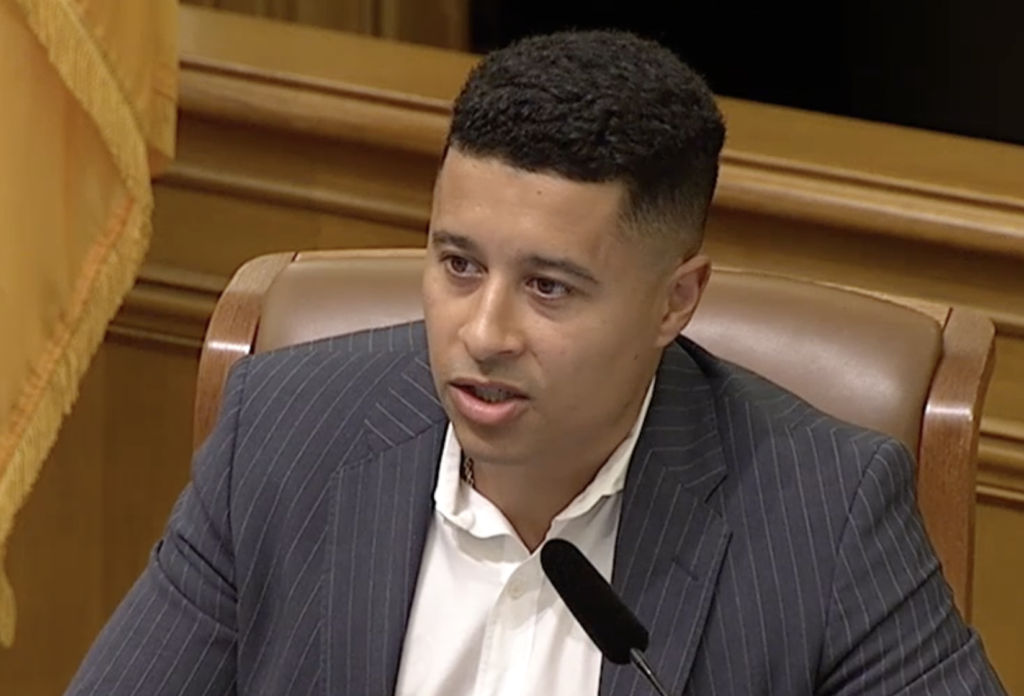In a remarkable meeting that reflects how the current politics of the city are impacting police policy, three of the mayor’s appointees to the Police Commission changed their positions Wednesday and voted against a policy limiting what everyone agrees are racist police traffic stops.
The policy advanced last spring with a unanimous vote after a lengthy public process. It would direct officers not to prioritize traffic stops for minor offenses like an expired license plate tag and to focus instead on more urgent public safety issues.

The policy hasn’t changed since then—but the Police Officers Association has used a common tactic of demanding “meet and confer” discussions to slow it down, and is now threatening legal action against the city.
And the mayor’s poll numbers are down, and she’s trying to raise them by going all-in on law enforcement.
Commission Vice-President Max Carter-Oberstone explained:
During general public comment this evening, Frank Noto from Stop Crime Action said Stop Crime Action supports banning pretext stops, but it just doesn’t support ending enforcement of common sense traffic laws. And I’m finding myself right now in the uncharted territory of actually agreeing with Frank Noto, because that’s actually what this policy does. It identifies nine Vehicle Code infractions that have been proven to have no public safety benefit, and it deprioritizes stops, but not enforcement.
The two infractions on this list that make up the lion’s share of the stops for the department are license-plate-related stops and registration tags. Those are around 4,000 each, and for each type of stop, arrests are made in less than 1 percent of cases. Guns are discovered in less than 1 percent of cases. So in the 99 plus percent of the time, those stops are not yielding any benefit to the public. And at a time of critically low staffing, it is incumbent upon us to marshal our scarce law enforcement resources intelligently and effectively.
Oh, and the people stopped on these “pretexts” are overwhelmingly Black and Latino. That data, on both a local and a national level, is overwhelming.
Oh, and this policy was carefully vetted through more than a dozen Human Rights Commission meeting, a working group that included front-line police officers and police brass.
Chief Bill Scott has been involved all along, and everything he suggested has been included in the policy.
Carter-Oberstone moved that the commission adopt the policy and give the department no more than 120 days to implement it.
Commission President Cindy Elias noted the “fallacy that these Department General Orders are not vetted,” which is part of the mayor’s campaign for Prop. E, which would undermine the authority of the Police Commission. She noted that “90 precent of the DGOs are drafted by the department.”
As Commissioner Kevin Benedicto pointed out, in some departments, 20 percent of patrol officer time is devoted to minor traffic stops. If San Francisco implemented this policy, it could be the equivalent of a major increase in staffing, since cops could devote their time to other things.
And yet: Three of Breed’s appointees made almost incomprehensible, illogical arguments against a policy they all supported less than a year ago.
Debra Walker said that “we are restricting our officers enforcing a state law. … Do we have the ability to tell officers what to enforce and what not to enforce?”
That’s just nuts. As Carter-Oberstone, who is a lawyer, noted, cities set law-enforcement priorities all the time. That’s been the case for more than 100 years, he said, and anything that undermined that “would upset over a century of legal precedent.”
Walker also said the commission was “getting engaged in telling officers what to do.” Jim Byrne chimed in on the same point, saying that “if the rank and file can’t be brought a long then we have a problem. We can punish officers for violating the policy, but will we have accomplished anything?”
Again, that’s nuts. The Police Commission sets the rules for police officers, and the officers have to follow those rules. This has been the case for decades. Sometimes the cops like it, sometimes they don’t, but the city, through the commission, is their employer, and has every right to set the rules of employment. If Byrne was right, then there would be no reason to have a Police Commission, or even a chief; the cops could just do whatever they want.
The Larry Yee argued that the commission was set to go into closed session to discuss the policy later in the meeting; why vote on it before hearing from the city attorney?
But as Elias noted, the city attorney has given the commission advice on this many, many times already. The closed session would consider how to deal with the prospect that the POA might sue, since the meet-and-confer process has reached an impasse.
That has nothing to do with the legality of the policy itself. “Everyone was present for the closed session last week,” Elias said.
Carter-Oberstone, who is always professional and polite, noted gently that he had to wonder “if these concerns are genuine.”
I’ll just say it: This was entirely political.
Breed is furious at Carter-Oberstone, who she appointed, because he is independent and doesn’t do her bidding. That’s one reason she’s pushing Prop. E, to undermine her own commission. None of this has any basis in reality or in proper public policy.
So the commission voted 4-3 to implement the pretext policy. Then the members went into closed session, and emerged, and made no changes.






